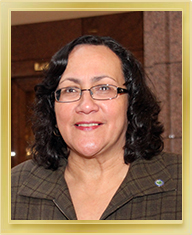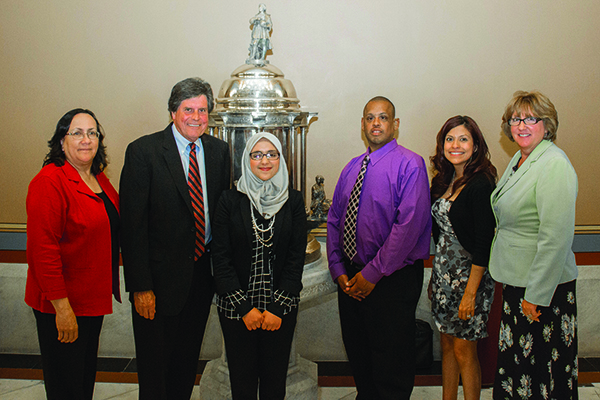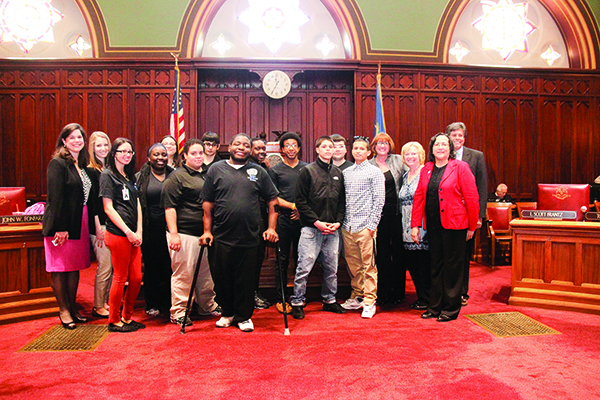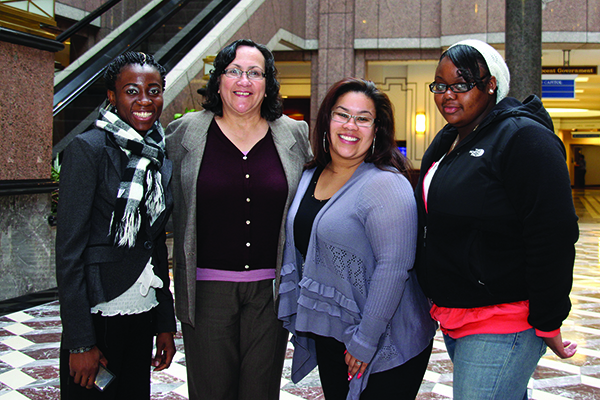
STATE REPRESENTATIVE
Hilda Santiago

Serving the 84th Assembly District
Legislative Office Building, Room 4000
Hartford, CT 06106-1591
Capitol: 800-842-8267
Hilda.Santiago@cga.ct.gov
SENIORS
Protecting The Elderly
In situations where abuse or neglect is suspected, the Department of Social Services can now petition a probate court to gain access to that person’s home to make an assessment. The definition of neglect has been expanded to include elderly people who do not live alone, but whose caretaker fails to arrange for the necessary services to keep an elderly person healthy.
Patient-Designated Caregivers
The CARE (Caregiver Advise, Record, Enable) Act requires that a hospital document a caregiver in the patient’s discharge plan, designated by the patient. They must attempt to notify the caregiver and to instruct the caregiver on post-discharge tasks.
HELP FOR JOBLESS VETERANS
This session we worked to streamline the state licensing process for our job-seeking veterans. Connecticut veterans can now apply their military training toward occupational licenses, including public safety positions and a variety of trades. In addition, college credits can be awarded for specialty training and apprenticeship credits applied to specific trades.

Honoring the legacy of Prudence Crandall with Rep. Simmons and Rep. Morris.
CONSUMERS
Variable Electric Rates
Connecticut became the first state in the nation to protect residents from electricity providers who offer a low introductory rate that increases rapidly. The protections require competitive electric suppliers to give their customers a 60-day notice before the end of their contracts. Suppliers cannot charge customers a termination or early cancellation fee and must allow customers to switch providers within 72 hours.
VETERANS
The Legislature recognizes the important sacrifices that veterans have made. We have established the Women Veterans Program to help connect female veterans to services, and the Veterans to Agriculture Program to give tax credits to vets working in agricultural production. We created the Incarcerated Veterans Reintegration Council to help incarcerated vets reintegrate back into their communities.

Hilda, Rep. Altobello, Rep. Abercrombie and members of the Boys & Girls Club at the Capitol.
SMALL BUSINESS
This year we allocated more funds for the highly successful Small Business Express Program. We are also requiring the Department of Economic and Community Development to dedicate funds to develop a program for construction projects for minority business enterprises. These moves will create jobs and better economic opportunities for Connecticut families.
FUNDING FOR LOCAL YOUTH ORGANIZATIONS
This session, my colleagues and I were able to secure funding that supports our city’s violence prevention programs. The impact violence has on a young person is not only critical to their overall state of well-being, it is critical to the health and growth of our community.
It is encouraging to work with these remarkable local organizations and our police department in an effort to provide more productive options for our young people.

Hilda, Rep. Altobello & Sen. Bartolomeo welcoming students from Meriden in Senate Chambers.
BIRTH TO THREE PROGRAMS
Beginning this year, hearing tests will now be included in the Birth-to-Three program. This program offers parents and guardians a variety of tools to ensure that their toddlers and children are properly screened and cared for if they are found to have a disability during this essential developmental period. Early detection of a delay or disability help parents and guardians make use of early intervention services for their infant or toddler.
STUDENT LOANS
A historic step increasing college affordability, the Connecticut Higher Education Supplemental Loan Authority (CHESLA) announced it will offer a fixed interest rate of 4.95% for new student loans, down from its current rate of 6.75%. Not only is this the lowest rate that CHESLA has ever offered, it is also significantly lower than the new Federal PLUS loan rate of 6.84%.
REDUCING REQUIRED TESTING IN SCHOOLS
Since the rollout of No Child Left Behind almost 15 years ago, standardized testing has come under a lot of scrutiny. One area of concern is that there are simply too many tests. For example, juniors in high school are currently required to take the SBAC exam at a time when many of them are taking the SAT or ACT college admission tests.
As we work statewide and across the country to improve the use of standardized tests, the legislature took another big step forward this year by allowing schools to waive SBAC testing for any students taking these college admissions tests.

Hilda with students from Meriden at the Legislative Office Building.
SECLUSION AND RESTRAINT IN SCHOOLS
No one wants to restrain or seclude a child. Unfortunately, it may be necessary for safety reasons. It is critical to have a plan in place to ensure students’ safety and to provide clear guidelines for school personnel when a student’s behavior may warrant such measures. Key provisions of this law include prohibiting teachers, administrators, and other public school employees from using life-threatening or prone physical restraints on students. School employees may only place a student in seclusion to prevent immediate or imminent injury to the student or others, and are prohibited from using physical restraint or seclusion for the sole purposes of punishing the student, because it is convenient, or instead of a less restrictive alternative. The school board must notify a parent immediately or at least within 24 hours of their child being secluded or restrained.
